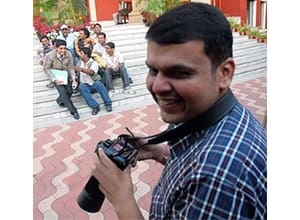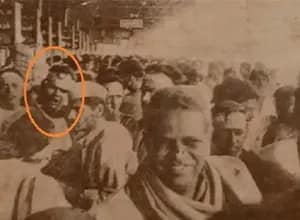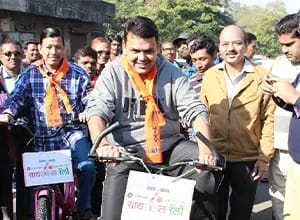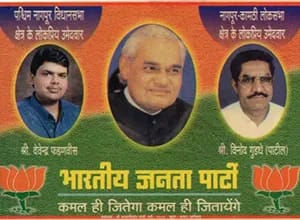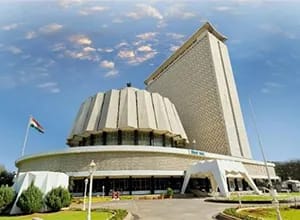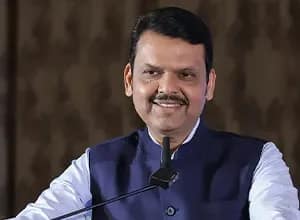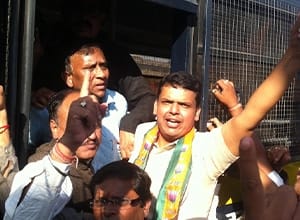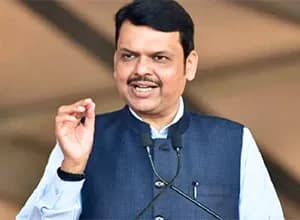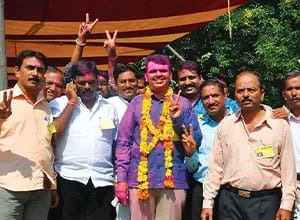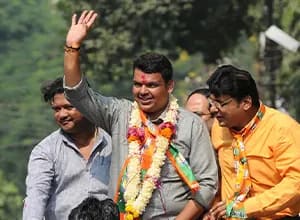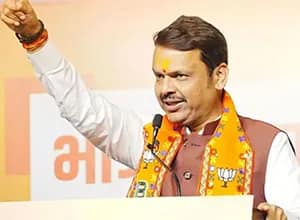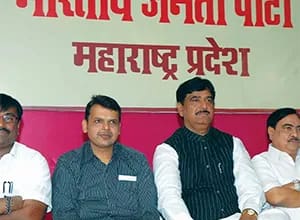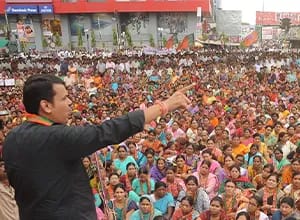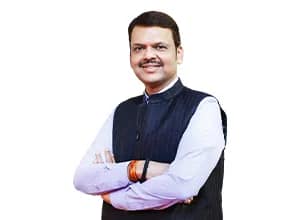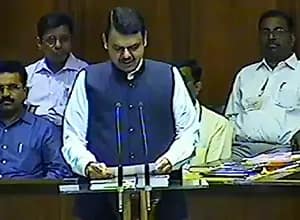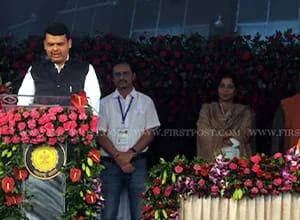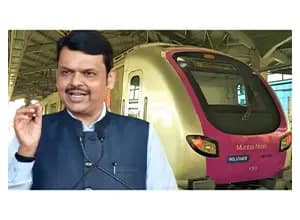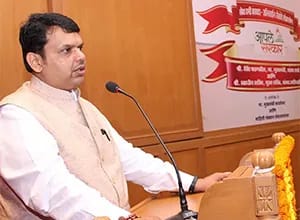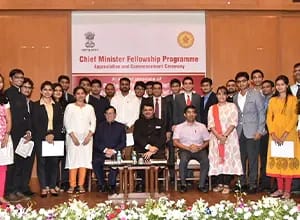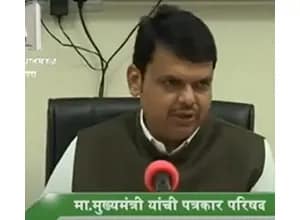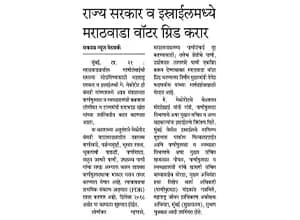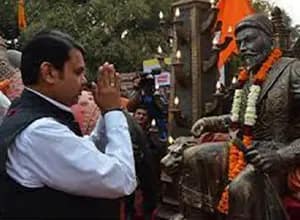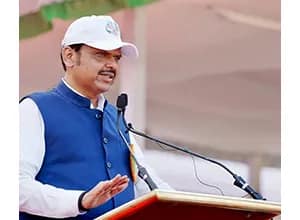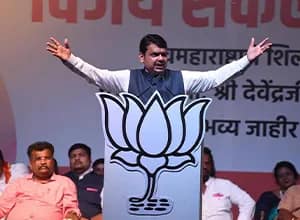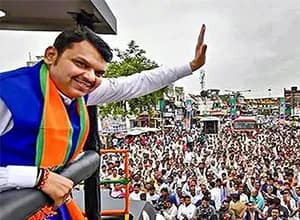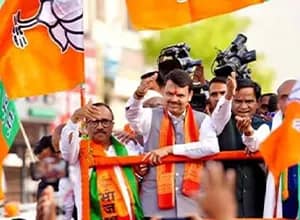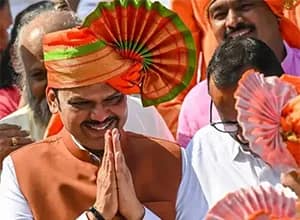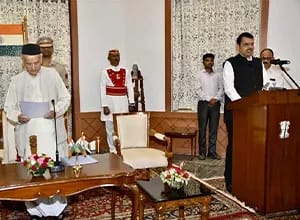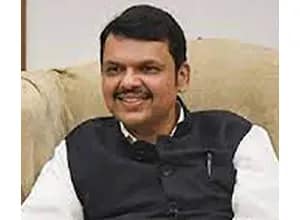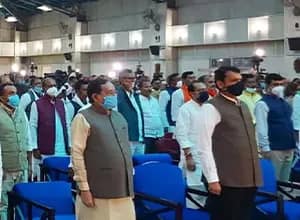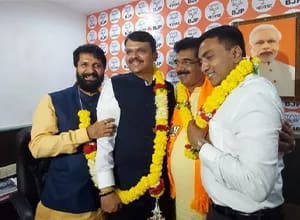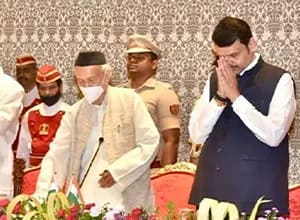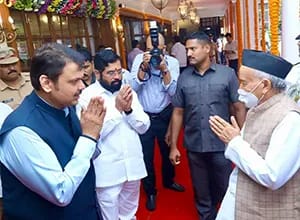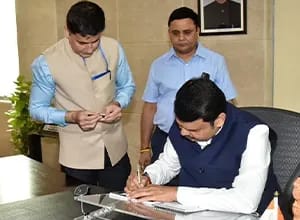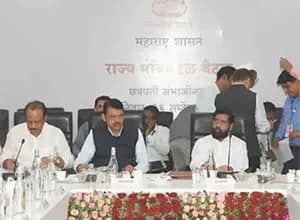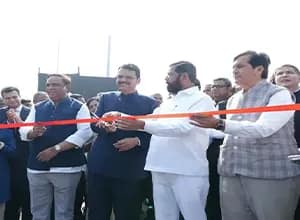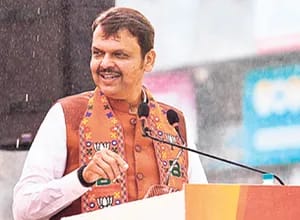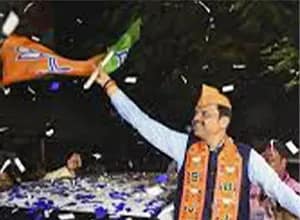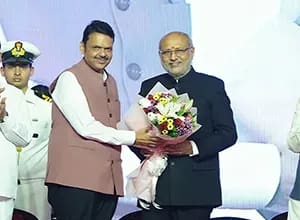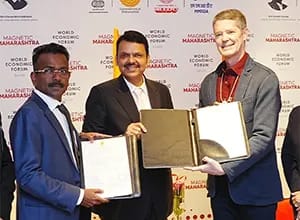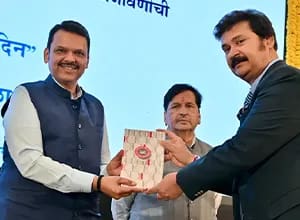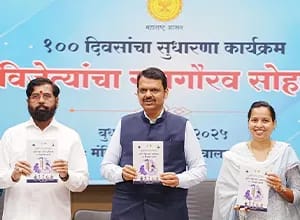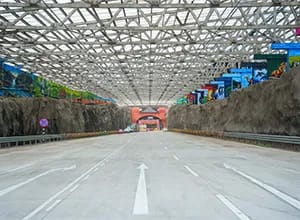Became a member of the Akhil Bharatiya Vidyarthi Parishad and a volunteer of the Rashtriya Swayamsevak Sangha, actively participating in various social and political activities.
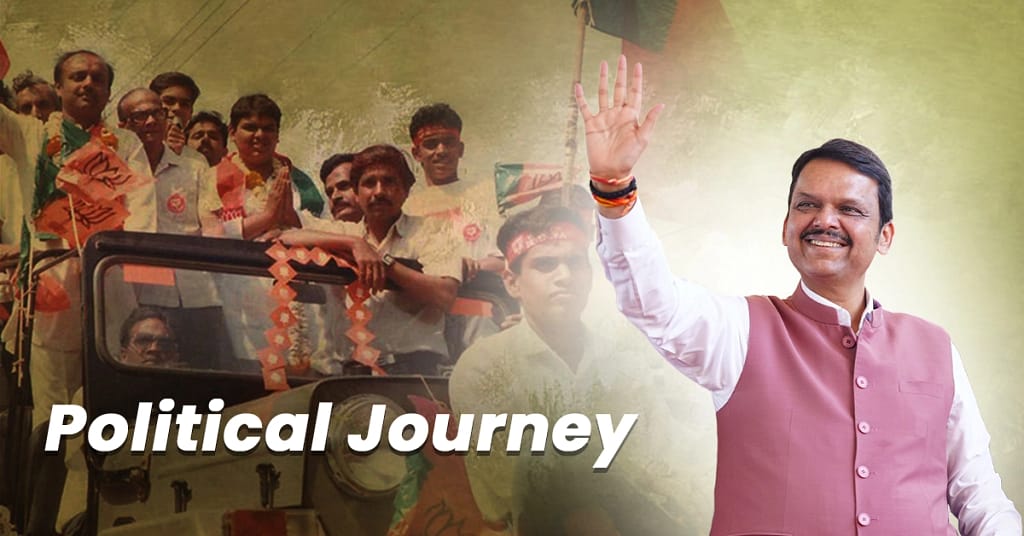
Devendra Fadnavis’ political journey: From grassroots to third-time CM
The fate of a political party depends on the character of its leadership. The current dominance of the Bharatiya Janata Party in Maharashtra can be attributed to one person—Shri Devendra Sarita Gangadharrao Fadnavis. His vision, dynamism, honesty, and decision-making are the qualities that have made him a standout leader, but more than that, it’s his commitment to Maharashtra and its people that has carved out a place for him in the hearts of the people. While these are some of the facets of his personality, the other facets include his excellent rapport with PM Modi and other key people, outreach to other parties, high confidence from the industries, popularity among the party colleagues, strong connection to the grassroots, outstanding election strategies, and so on. Entering politics at a very young age, Fadnavis’s rise to become the chief minister of the state for the third time has been a remarkable journey marked by many political and administrative milestones. Here we will look at some of them.
Born into a progressive, middle-class family in Nagpur, Devendra Fadnavis began his political career with the Akhil Bharatiya Vidyarthi Parishad (ABVP). He became a corporator in 1992 and the mayor of Nagpur in 1997. Then in 1999, he was first elected as an MLA. Subsequently, for seven consecutive terms, he was elected to the Maharashtra Legislative Assembly, out of which three times he took oath as the Chief Minister, once as the Leader of the Opposition, and once as the Deputy CM, besides holding other portfolios, such as Home Minister, Finance Minister, and Water Resources Minister. His tenures as the Chief Minister of Maharashtra from 2014 to 2019 and as the Deputy Chief Minister from 2022 to 2024 heralded a development era for Maharashtra. In the assembly election of 2024, following a landslide victory, he took oath as the third-time Chief Minister of Maharashtra.
Elected as the Ward President of Bharatiya Janata Yuva Morcha
Devendra Fadnavis was elected as the Dharampeth Ward President of Bharatiya Janata Yuva Morcha in 1989. This was his initial stage in politics. After this election, he took charge of the party’s work at the local level. During this period, he started membership drives to introduce new faces in the Yuva Morcha to strengthen the organization. Along with this, he actively participated in various social and political programs in the ward.
Appointed as the office bearer of the Bharatiya Janata Party’s Nagpur West constituency
In 1990, while working as the local office bearer and publicity head of the Bharatiya Janata Party in the Nagpur West assembly constituency, Devendra Fadnavis started getting involved in understanding the problems of the citizens of the constituency and solving them. He was also seen providing information about various government schemes to the citizens. During this time, he came into direct contact with many leaders through his active engagement in social work, which he took up to strengthen the party’s base among common people.
First Karseva and 15 days in jail
Devendra Fadnavis performed his first Karseva on October 30, 1990, at the age of 20, while he was a college student and an activist of the Akhil Bharatiya Vidyarthi Parishad. He and his colleagues boarded the train to Prayagraj (erstwhile Allahabad) at Nagpur at least a week before the event. But the then government had blocked all the roads leading there. A determined Devendraji set off on foot with others for Ayodhya. While on their way, the police tried to stop them by firing in the air and using batons. All of them were caught and thrown in the Central Jail of Badaun. Fadnavis and other Kar sevaks were in jail for about 14 to 15 days in Badaun.
Nagpur Bharatiya Janata Yuva Morcha President
In 1992, Devendra Fadnavis was elected president of the Bharatiya Janata Yuva Morcha in Nagpur city. As president, he would always motivate the youth to actively engage in the party’s programs, involving nationalistic activities, social work, agitation for good governance, and the like. He would also work passionately to bring more youth into politics by organizing various social and cultural programs in Nagpur city.
State Vice President of Bharatiya Janata Yuva Morcha
In 1994, Devendra Fadnavis was appointed as the Maharashtra State Vice President of the Bharatiya Janata Yuva Morcha. In this role, he toured all across the state, interacting directly with young people to strengthen the Yuva Morcha network. He fulfilled this responsibility at the state level very effectively.
Elected as a corporator for the successive term
Following his first election win in 1992, Fadnavis secured a second term for the corporator post from Ramnagar ward. The knowledge and experience he gathered in the first term about the responsibilities of a corporator and the working procedure in the municipal corporation helped him excel in the second term, as he completed many works in his ward without the interference of middlemen.
Elected as Mayor of Nagpur
Devendra Fadnavis became the mayor of Nagpur Municipal Corporation. At 27, he became the second-youngest mayor in India. He served as the mayor of Nagpur for two consecutive terms, from 5 March 1997 to 6 February 1998 and from 7 February 1998 to 4 February 1999. As Mayor, Devendra Fadnavis took important decisions to resolve vital problems. For example, he started the Pench Water Supply project to ensure the municipal water supply in Nagpur and make the city tanker-free. At the same time, he made changes to the city’s octroi system to reduce the tax burden on the traders and consumers. While he took steps to raise funds for the development of Nagpur city, he took a bold decision to charge the defaulter property owners double the amount of taxes pending against their properties. As a result, a revenue of Rs 35 crore was collected by the Nagpur Municipal Corporation during his tenure. While working as the mayor of Nagpur, Devendraji was also elected as the chairman of the Maharashtra Mayors’ Committee.
Mayor in Council: Election Elected as the first Mayor of Maharashtra
In 1998, Devendra Fadnavis was elected as the first mayor of Maharashtra under the mayor-in-council system. The mayor-in-council system is a system of municipal administration that involves a mayor and a council. The mayor, the executive head of the municipal corporation, and other elected corporators form a council (also called the Standing Committee) that holds executive powers. The members of the council are given responsibility for specific departments such as water supply, health, education, etc.
Assembly Elections 1999: First victory as an MLA by 9 thousand votes
Devendraji became an MLA for the first time in 1999. He took oath as an MLA on 21st October, 1999, in the Legislative Assembly, representing the Nagpur West constituency. In his first election contest for the Legislative Assembly, Devendra Fadnavis got 94,853 votes and won by 9,087 votes. The percentage of votes he got was 48.66%. The total number of voters in his constituency was 399,195, of which 198,843 voters exercised their right to vote. A total of 11 candidates were in the fray from the Nagpur West constituency in 1999.
First aggressive and scholarly speech in the legislature
After becoming an MLA, Devendra Fadnavis made his first speech in the legislature on December 16, 1999, during the winter session. He expressed his opinion supporting the resolution moved by the opposition party leaders regarding cotton. In his very first speech, Devendraji showed preparedness and depth of knowledge on the subject and context. Demanding an increase in the prices announced by the government for the produce of farmers in Vidarbha, Devendraji reviewed the import duty and export subsidy imposed on agricultural produce and how other crops like sugarcane and the sugar made from it are protected. Also, demanding price protection for the cotton crop in Vidarbha, he said, despite the cotton monopoly scheme, is putting pressure on the government’s treasury; price protection will provide relief to cotton farmers. At the same time, he made some suggestions on how the Marketing Federation should work. Thus, Devendraji, while representing his constituency, had made a point-by-point and scholarly presentation in his very first speech against the injustice done to farmers and demanded justice from the government.
Government’s attention was drawn to slums and ownership strips for slum dwellers
Devendra Fadnavis had strongly expressed his views on the condition of slums and the ownership strips for slum dwellers while participating in the discussion on supplementary demands of the Housing and Special Assistance Department in the 1999-2000 budget on 20 December 1999. While demanding protection of slums in the state created before 1999 and the handing over of the ownership strips to slum dwellers, he discussed the slums of Nagpur, Pune, and other districts except Mumbai.
National Vice President of Bharatiya Janata Yuva Morcha
In 2001, Devendra Fadnavis was appointed the National Vice President of the BJP Yuva Morcha. He was the youngest youth from Maharashtra to hold this post. At the national level, he was instrumental in spreading and strengthening the party network and conveying the party’s policies to the youth using his oratory skill.
Commonwealth Parliamentary Board: Received the Outstanding Parliamentarian Award of Maharashtra Legislative Assembly
In 2003, Devendra Fadnavis was awarded the Outstanding Parliamentarian Award of Maharashtra Legislative Assembly by the Maharashtra branch of the Commonwealth Parliamentary Board. He received this honor for his effective participation in the Legislative Assembly, scholarly opinions and effective presentation of issues of public interest. This is considered an important milestone in his political career. The Commonwealth Parliamentary Board was first established in England in 1911 under the name ‘Empire Parliamentary Association.’ Initially, the members of this board were Australia, Canada, Newfoundland, New Zealand, South Africa, and the United Kingdom. The name of this board was changed to ‘Commonwealth Parliamentary Board’ in 1948. The Commonwealth Parliamentary Board comprises more than 17,000 members of parliament and legislature from a total of 54 countries. This board helps in the exchange of information on parliamentary working systems of its member countries.
Assembly Elections 2004: Victory for the second term by twice the previous margin
The 2004 assembly election result saw Devendra Fadnavis victorious from the Nagpur West constituency by a margin double that of the previous term. The elections were held on 13th October, and the results were declared on 16th October. A total of 19 candidates, including Devendra Fadnavis, were in the fray from the Nagpur West constituency. There was a total of 444,846 voters in this constituency; of them, 232,618 voters cast their votes. A total of 113,143 votes went in favor of Devendra Fadnavis. He won this election by a margin of 17,610 votes.
Assembly Elections 2009: Resounding victory sealed his third term, even after constituency reorganization.
In 2009, the Election Commission reorganized the constituencies. As a result, Devendra Fadnavis had to relinquish his Nagpur West seat. So, he contested from the Nagpur-South West constituency, and the result was no different! Even the new constituency elected him by a margin of 27,775 votes. The election was held on October 13, 2009, and the results were announced on October 22, 2009. There were 15 candidates in this constituency with 350,671 voters, of whom 174,649 persons had voted. Devendra Fadnavis received 89,258 votes, defeating the opposition candidate by 27,775 votes. This victory was a testament to his effective strategy, leadership, and increasing popularity. This election marked a new political direction in the Nagpur South West constituency opening new avenues for development.
General Secretary, Bharatiya Janata Party, Maharashtra
2010 saw the entry of Devendra Fadnavis in the state hierarchy as he was appointed Maharashtra State General Secretary of the Bharatiya Janata Party. While he contributed to strengthening the party with his profound organizational skills, this period also witnessed repeated agitations led by him for justice to the deprived communities like Valimiki, Sudarshan, Mahiyar, etc. Along with this, his ‘Janata Darbar’ initiative, started in 2008, was reinforced. He focused most on resolving the grievances of the people.
Became the Maharashtra State President of the Bharatiya Janata Party
On April 11, 2013, the central leadership of the Bharatiya Janata Party selected Devendra Fadnavis as the state president for Maharashtra, declaring that the upcoming assembly elections in the state would be contested under his leadership. Having given the principal responsibility for the 2014 assembly election, the new Maharashtra BJP president, Devendra Fadnavis, went about forging unity among the opposition parties against the Congress-NCP alliance, which was in power at that time. Waging attacks on the ruling parties, he exposed a big scam in the water resources department, producing some 14000 pages of proof against the massive financial irregularities in several irrigation projects. He also published a black paper on the irrigation scam and brought out many details. Besides organizing street protests, Fadnavis kept the government under pressure with his fiery speeches in the Legislative Assembly on several issues. Establishing the Bharatiya Janata Party as a formidable opponent, he moved ahead to challenge the ruling parties in the 2014 election.
Lok Sabha Elections 2014: Maharashtra’s great success under the leadership of State President Devendra Fadnavis
Devendra Fadnavis played a pivotal role in the Maharashtra BJP’s election campaigns in the 2014 Lok Sabha and Assembly polls. In 2013, after being made the president of the Maharashtra BJP with responsibilities for the 2014 elections, Devendraji toured all parts of the state, uniting party workers and holding numerous meetings, to fortify the party’s position. His earnest efforts bore fruit; the BJP’s grip in rural and urban areas was strengthened. The party’s ideology and goals had resonance with the farmers, youth, traders, women, and urban voters. The information about the model implemented by Narendra Modi in Gujarat was conveyed to the voters. Apart from these, Devendra Fadnavis also worked out to keep the BJP-Shiv Sena alliance strong.
The voting for the Lok Sabha elections in Maharashtra was held in 4 phases. The first phase was held on April 10, the second on April 17, the third on April 24, and the fourth on April 30. The results, announced on May 16, 2014, were fabulous for the BJP and Shiv Sena alliance. Of the total 41 MPs of the alliance that won, 23 were from the BJP and 18 from the Shiv Sena. This great performance under the leadership of Devendra Fadnavis strengthened the party’s position and paved the way for the upcoming assembly elections.
Has been a member of several legislative committees
Legislative committees play a crucial role in the functioning of the Legislative Assembly and the Legislative Council, as well as in the effective implementation of various schemes of the government. Legislative committees are an important part of parliamentary democracy. They are given special powers to carry out focused and in-depth examinations of the proposed legislation, government policies, and budgetary allocations decided in the legislative assembly. Devendra Fadnavis worked effectively on important issues in the state by working in several legislative committees such as Estimate Committee, Rules Committee, Public Undertaking Committee, Request Application Committee, Standing Committee on Urban Development and Housing, Joint Select Committee on Reserve Funds, Joint Select Committee on Self Finance Schools, and Joint Select Committee on Maharashtra Jeevan Pradhikaran. He was also chosen as the convener of a high-powered committee of chief ministers constituted for the transformation of Indian agriculture.
During 2010-11, Devendraji had secured land titles for the people of Kamgar Colony in Mouja Parsodi and Sant Tukdoji Nagar in Nagpur city through the Assembly Request Application Committee.
Assembly Elections 2014: BJP wins highest 122 MLAs under Devendra Fadnavis
The 2014 Lok Sabha elections were a defining event in the history of Indian politics. Under the leadership of Narendra Modi at the Centre, the BJP won a historic victory, with reverberations felt across the country. Maharashtra was no exception. However, behind this victory were the hard work of many leaders, and one of the important names was Devendra Fadnavis. At that time, Devendra Fadnavis, who was the Maharashtra state president of the BJP, put forward a grand performance as a star campaigner. His effective speaking style, memorizing the numerous data, studious approach, and clean image made him especially popular among young voters, which helped him continue his stellar performance from the Loksabha campaign to the Assembly election with a grand victory yet again. The BJP won 122 seats, including Devendra Fadnavis’s Nagpur South-West seat, marking his 4th successive win. Fadnavis got 113,918 votes from the Nagpur South-West constituency, to win by a huge margin of 58,942 votes. This difference was as much as 30.80 percent. His popularity and public trust were evident behind this victory, which carved out an important place for himself in Maharashtra politics.
Devendra Fadnavis was sworn in as the 18th Chief Minister of the state
Devendra Fadnavis took oath as the 18th Chief Minister of the state on 31 October 2014 at the Wankhede Stadium in Mumbai and led the state as the Chief Minister for 5 years and 12 days from 31 October 2014 to 12 November 2019. He became the second Chief Minister in Maharashtra to complete a 5-year term, after Vasantrao Naik, who served as the Chief Minister for 11 years and 58 days. Incidentally, both these leaders are from Vidarbha.
After the Lok Sabha elections in 2014, the Assembly elections were announced in the state on 15 October 2014. As all the political parties in the state decided to contest the elections independently, signs of a four-way fight were seen in all the constituencies. After their crushing defeat in the Lok Sabha elections, the Congress and the Nationalist Congress Party decided to break their alliance and face the Assembly elections separately. Similarly, due to the seat-sharing dispute between the BJP and Shiv Sena, both these parties also broke their 25-year alliance and contested the elections independently. Meanwhile, in 2013, Devendra Fadnavis was made the state president of the BJP with the responsibility of the 2014 election. Under his leadership, the BJP won 122 seats in Maharashtra for the first time. Devendra Fadnavis’s dynamism and clean image became his strength. He has never been accused of corruption. No party got the absolute majority in this election, but the Bharatiya Janata Party bagged the highest number of seats, 122 seats, to become the number one party. In the 2009 election, the BJP had won only 46 seats. In 2014, its seat share increased by 76 seats.
Work started on the Mumbai Coastal Road project
After the BJP-Shiv Sena coalition government came to power in Maharashtra, Chief Minister Devendra Fadnavis announced fast execution of projects like the Bandra-Versova Link, Nariman Point-Kandivali Coastal Road, and Mumbai Trans Harbour Link, which were stalled during the previous government. The Coastal Road project, although a very ambitious north-south corridor project to ease the crippling traffic jams in the city and in the news since 1960, was never advanced beyond mere discussions. Fadnavis decided to implement it by taking care of all hurdles, including the environmental objections. The primary objective of this project is to enhance traffic management in the city by developing a state-of-the-art expressway along the seashore.
Jalyukt Shivar Abhiyan: Water for All, Scarcity-Free Maharashtra
Water scarcity, severe in places, had been the number 1 problem in Maharashtra for ages, crippling the agriculture and the rural economy. After taking the oath, the Fadnavis government set its priority on sustainable water management and irrigation by launching the ‘Jalyukta Shivar Abhiyan’ program on 5 December 2014, with the slogan ‘Water for All—Scarcity-Free Maharashtra 2019.’ The program aimed to make the state water-empowered and drought-free by 2019 through water conservation and other measures.
On 31 October 2014, when Devendra Fadnavis took charge of Maharashtra as the 18th Chief Minister, the state had been reeling under drought from the preceding years. The new chief minister was prompt in his action. A cabinet subcommittee was formed under the chairmanship of the Relief and Rehabilitation Minister within 15 days to review the drought situation and seek assistance from the center as an immediate measure. Meanwhile, to find a permanent solution to the drought situation in the state, Chief Minister Devendra Fadnavis studied the existing irrigation and water conservation systems in the state. After studying about 28 schemes like the Ralegan pattern, the Shirpur pattern, and the Hiwarebazar pattern, etc., it was decided to launch a new program called ‘Jalyukta Shivar Abhiyan,’ which will be a government-people initiative to eliminate drought, implementing appropriate irrigation patterns wherever suitable.
Metro 2 project approved within a month of assuming the office of Chief Minister
In a stark contrast, where the Mumbai Metro had only one corridor of 11 km length in 11 years during the Congress-NCP government, under the Fadnavis government it blossomed into a big network of currently 68.93 km, spread all across the MMR. It is because of the personal involvement of CM Fadnavis in announcing new routes, arranging funds, monitoring execution stages, commuters’ convenience, etc. Soon after coming to power, Fadnavis approved the Metro Line 2 project on December 11, 2014.
The ‘Right to Service Act’ for the common man!
Political leaders are rarely known for keeping their promises, but Devendra Fadnavis is an exception. In the first cabinet meeting of his government, held on 1 November 2014, it was decided to enact a law to implement the Service Guarantee Act. Accordingly, the Fadnavis government got the bill passed through both houses in the budget session of 2015, making way for the Maharashtra Public Service Right Act 2015, coming into force from 28 April 2015. The Service Guarantee Act was on the wish list of Fadnavis since 2011, when he, as an opposition MLA, introduced a non-government bill named ‘Maharashtra State Service Guarantee Bill’ in the Legislative Assembly to ensure ‘service right’ and ‘service guarantee’ for the citizens. Although discussed in the Legislative Assembly in 2013, the bill was wrapped up by the then government. But when Devendraji formed his government in 2014, one of the first few decisions he took was the enactment of the Maharashtra Right to Public Service Act 2015.
Chief Minister’s Fellowship Program: Engaging youth interns in public services
Chief Minister Devendra Fadnavis launched the CM Fellowship Program, an 11-month internship program for young graduates from the state, in 2015. This initiative, implemented by the Chief Minister’s Office, was launched to engage the youth of the state in the development process of the government and also provide them with valuable experience through their work in project administrations. The Chief Minister’s Fellowship Program is meant for graduate or higher-qualified youth between the ages of 21 and 25, with stipends paid every month during their tenure. The government decision to launch the CM’s Fellowship Program was issued on 29 May 2015.
Announcement of Nagpur-Mumbai Super Communication Expressway
The marquee infrastructure project of Devendra Fadnavis, the Nagpur-Mumbai super expressway, was announced in the Legislative Assembly on 31 July 2015, within a year of taking oath as the Chief Minister on 31 October 2014. The idea of a highway from Nagpur to Mumbai, bringing development to the vast regions that fall in between, was nurtured by Fadnavis for 20 years. After becoming the CM, Fadnavis took a bold decision to implement this project, laden with many hurdles. The official announcement for the project was made in the Legislative Assembly for the first time in 2015.
Special Cabinet Meeting: A critical decision for Marathwada
Despite many stalwart political leaders from Marathwada, the region remained neglected on many counts. The late Chief Minister Vilasrao Deshmukh, who was from Marathwada, had organized a cabinet meeting in Aurangabad in 2008 to resolve the pending issues in Marathwada, but that failed to bear any fruit. In contrast, when Chief Minister Devendra Fadnavis held a cabinet meeting in Aurangabad on October 4, 2016, a total of 29 decisions were taken for Marathwada, related to irrigation, water conservation, agriculture, animal husbandry, dairy farming, public works, revenue, rural development, tourism, forests, higher and technical education, housing, energy, and so on, for the region, with a time-bound program worth Rs 49,248 crore to implement these decisions. In this, irrigation 9291 crore, railways 5326 crore, roads 30 thousand crore, airports 250 crore, micro-irrigation 450 crore, agriculture/water conservation 1885 crore, higher education 605 crore, medical education 120 crore, power supply 1175 crore, and a program of Rs 180 crore for housing were decided.
Marathwada Water Grid: Water in every home in Marathwada!
Keeping in mind the acute shortage of water for domestic and industrial uses in Marathwada due to severe drought, the Fadnavis government announced the Marathwada Water Grid project in 2016. The project was designed to cover a total area of 64,590 sq km in Marathwada, benefitting 79 cities, 76 talukas, and 12,978 villages. The water will be sourced from a network of 11 dams in the Marathwada region and will be supplied through a network of pipelines 1330 km in length. The dams include Jayakwadi (Chhatrapati Sambhajinagar), Yeldari (Parbhani), Siddheshwar (Hingoli), Majalgaon (Beed), Manjara (Beed), Urdhva Painganga (Yavatmal), Nimna Terna (Dharashiv), Nimna Manyar (Nanded), Vishnupuri (Nanded), Nimna Dudhana (Parbhani), and Sina Kolegaon (Dharashiv) dams. Also, the dams will be recharged with the excess floodwater from the rivers in western Maharashtra through a river-linking project.
Chhatrapati Shivaji Maharaj Shetkari Samman Yojana
Due to insufficient rainfall in various parts/districts of the state during the four years 2012-13 to 2015-16, crop prices were announced in a large number of places to be less than 50 paise during the Kharif and Rabi seasons. Also, due to untimely rainfall and drought in some parts of the state in the years 2013-14 and 2014-15, farmers suffered a lot. As a result, many farmers could not repay the loans taken from the banks, which led to the banks refusing to give further loans to these farmers. This made the situation of the farmers very difficult. Some farmers tried their luck once again by taking money from private moneylenders at double interest. But even there, as luck did not favor them, the loan and interest of the moneylenders only kept increasing. Some farmers, distressed by this, lost hope and committed suicide. Against this backdrop, Chief Minister Devendra Fadnavis announced the ‘Chhatrapati Shivaji Maharaj Shetkari Samman Yojana – 2017’ to make sure that the livelihood of the ryots remains intact and that they can work with dignity, grow grains, and feed their families with happiness again. The Fadnavis government took a historic decision in the cabinet meeting held on June 24, 2017 to waive off the debts of about 40 lakh farmers in the state. In this meeting, it was decided to waive off loans of up to Rs 1.5 lakh to farmers who had outstanding debts taken between April 1, 2012, and June 30, 2016.
Highlights of the scheme
- 89 lakh farmers’ loans worth Rs 34,000 crore waived
- Loans of up to Rs 1.5 lakh waived
- 40 lakh farmers’ 7/12 documents will now be recovered
- Farmers who have paid off their loans regularly will be given a subsidy of up to Rs 25,000 directly into their bank accounts
- Outstanding loans till 30 June 2016 were completely waived
- A large number of farmers who had moved from the institutional credit system to private financiers were brought back
1% Parallel Reservation for Orphans
Chief Minister Devendra Fadnavis took an important decision to provide 1% parallel reservation to orphans in the open category in the state through a cabinet meeting on 17 January 2018. Orphans face immense difficulties pursuing higher studies and careers after their period in the orphanages is over. Especially since their identity proofs (parents names, religion, etc.) are not known, they can’t get into colleges and hostels to qualify for jobs. For this, Devendra Fadnavis’ government provided a 1% parallel reservation to the orphan candidates for education, accommodation, and jobs in government or government-supported institutions.
In-depth survey and study ordered for the Damanganga-Vaitarna-Godavari River Link Project
Based on a preliminary favorable report, the state government decided to conduct an in-depth survey and investigation regarding the ambitious Damanganga-Vaitarna-Godavari Upsa Link Project to divert the excess water of the western channel rivers of the two basins of Damanganga and Vaitarna towards the Godavari basin in the east. The Devendra Fadnavis government approved an expenditure of Rs 23 crore 14 lakh 54 thousand 680 to prepare a comprehensive report based on an in-depth study and survey of this proposed river-linking project. Its government decision was published on June 4, 2018.
The Maratha Reservation Bill 2018 was unanimously passed in the legislature
The bill brought by the Fadnavis government for 16% reservation for the Maratha community people who are socially and economically backward was unanimously passed in the Legislative Assembly and Legislative Council on November 29, 2018. The bill was signed into law by the Governor on November 30, and came into effect from December 1, 2018.
23 out of 26 MPs won under the leadership of star campaigner Devendra Fadnavis
In the 2019 Loksabha election, Devendra Fadnavis repeated his 2014 performance and proved his popularity in the state by winning 41 out of 48 seats for the BJP-ShivSena alliance. After this victory, political analysts and journalists were unanimous that Devendra Fadnavis had more influence on voters than Sharad Pawar of the Nationalist Congress Party In the 2014 Lok Sabha elections, the alliance had won 42 out of 48 seats. At that time, BJP contested 23 seats out of 26 and won 18 seats while Shiv Sena contested in 22 seats. The back to back stellar performances of BJP- ShivSena alliance in Loksabha elections can be attributed to Devendra Fadnavis’s charisma, preparedness, and handling of coalition partners. Before the 2019 elections, there were looming issues of Maratha reservation and drought. However, Devendraji handled both these issues very competently; the Maratha reservation bill passed in both houses. Earlier, he formed the Backward Classes Commission to prove that the Maratha community was socially and economically backward. His sensible works, energy, and efforts for inclusive growth struck the chord with the masses.
Mahajanadesh Yatra 2019: Review of the work done in the last five years before the people
Chief Minister Devendra Fadnavis took out a Mahajanadesh Yatra in Maharashtra from 1 to 31 August 2019 with the aim of informing the people about the development works done between 2014 and 2019. This yatra was taken out in two phases. The first phase of the Mahajanadesh Yatra, a journey of 1639 km, covering 57 assembly constituencies in 14 districts, was started on 1 August from Mozar in Amravati and concluded in Nandurbar on 9 August, while the second phase, covering 2745 km through 93 constituencies in 18 districts, started on 17 August and ended on 31 August in Nashik. In this massive rally across the length and breadth of the state, Devendra Fadnavis took part in 87 large meetings and 57 welcome meetings/ceremonies in 238 villages. The Mahajanadesh Yatra covered 1232 km in 44 constituencies of Vidarbha, 622 km in 34 constituencies of North Maharashtra, 1069 km in 28 constituencies of Marathwada, 812 km in 29 constituencies of West Maharashtra and 638 km in 15 constituencies of Konkan. The purpose of the Mahajanadesh Yatra was to build connection and communicate the performance of the Fadnavis government in the last 5 years, to the common voters.
Maharashtra Assembly Elections 2019: Devendra Fadnavis enters the Legislative Assembly for the fifth time
In the 2014 assembly elections, a BJP-Shiv Sena alliance government was formed in the state under the leadership of Devendra Fadnavis. Between 2014 and 2019, under the Fadnavis government, Maharashtra scaled new heights through record industrial investments and many outstanding projects, such as Mumbai Metro, Nagpur Metro, Pune Metro, Samriddhi Highway, Jalyukta Shivar Abhiyan, Coastal road, trans-harbour link, etc. This period also saw landmark decisions like Maratha reservation, orphan reservation, farm loan waiv, etc., which were resonated well by the common people. All in all, the performance of the first Fadnavis government helped the BJP cross the hundred mark for the second time in a row in the 2019 assembly election, with 105 seats. It was also the 5th consecutive win for Fadnavis and 3rd from the Nagpur South-West constituency. Devendra Fadnavis got 1 lakh 9 thousand 237 votes, defeating the opposition candidate by 49 thousand 288 votes.
Second Chief Minister to complete the full term
The first term of Devendra Fadnavis as Chief Minister, which began on October 31, 2014, and ended on November 12, 2019, spanned 5 years and 12 days. He became the second Maharashtra Chief Minister to complete 5 years after only Vasantrao Naik, who had served for two consecutive terms (11 years and 78 days).
Devendra Fadnavis took oath as Chief Minister for the second time
After the 2019 Assembly results, Shiv Sena broke its 25-year alliance with BJP, demanding the post of Chief Minister. Due to this, BJP could not form the government despite getting the maximum 105 MLAs in the Assembly. As the people’s mandate was with Fadnavis, he took oath as Chief Minister for the second time on 23 November 2019 with the help of Ajit Pawar. However, this government did not last long as Ajit Pawar resigned as Deputy Chief Minister after a few days, forcing Devendra Fadnavis also to resign as Chief Minister on 26 November 2019. This was the shortest government in the history of Maharashtra, lasting only 72 hours.
Elected as the Leader of Opposition in the State
After the 2019 Assembly elections, Shiv Sena formed the Maha Vikas Aghadi government on 28 November 2019 making an alliance with the Congress and the Nationalist Congress Party. It left the BJP, despite having 105 MLAs of its own, to sit in the opposition with Devendra Fadnavis as the Leader of Opposition in the Assembly. Fadnavis held the post of Leader of Opposition for 2 years and 210 days from 1 December 2019 to 29 June 2022, when the ruling MVA government fell apart. As LOP Fadnavis made the Maha Vikas Aghadi government jittery, with charges of corruption, wrong policies, sluggish responses to calamities, and more.
Bihar Election In-charge: BJP has good success in Bihar
In the 2020 Bihar Assembly elections, the Bharatiya Janata Party’s central command appointed Devendra Fadnavis as the election in charge of Bihar. He led the BJP’s campaign in Bihar and introduced video broadcasting of Prime Minister Narendra Modi’s speeches in Bihar, maintaining social distancing in the wake of COVID-19. These rallies were shown on LED screens in five villages in each assembly constituency, allowing 100 rallies to be held simultaneously. He himself actively participated in the BJP’s core committee meetings and decided the campaign strategy. Under his guidance, the BJP used digital techniques in the Bihar election campaign, which proved to be a very effective strategy in the Bihar election.
Goa Election In-charge: Devendra Fadnavis’ Strategy and Success
The central leadership of the Bharatiya Janata Party appointed Devendra Fadnavis as the BJP’s election in-charge for the Goa assembly election on 8 September 2021. Taking charge of Goa election, he studied the political situation in Goa in depth and launched an invigorated campaign in coordination with the local leadership. Devendra Fadnavis toured various districts of Goa to unite the grassroots workers, resolve differences between local leaders, and strengthen communication with the electorates. With his hard work and strategy, BJP succeeded in retaining power in Goa. Of the 40 assembly seats in Goa, the BJP won 20 seats to retain power in Goa. Fadnavis’s election winning skills were once again in the headlines.
Swearing-in ceremony as Deputy Chief Minister of the state
In Maharashtra, the Uddhav Thackeray government collapsed due to a rebellion in the Shiv Sena led by Eknath Shinde. Following the subsequent political developments, Eknath Shinde, with the support of the majority of the Shiv Sena legislators, formed the government with the help of the BJP, led by Devendra Fadnavis. In this government, Eknath Shinde was sworn in as the Chief Minister of Maharashtra on June 30, 2022, while Devendra Fadnavis took oath as the Deputy Chief Minister of the state.
Accepted responsibility as Maharashtra’s Finance Minister for the first time
The portfolio allocation in the Eknath Shinde-Devendra Fadnavis government was done on August 14, 2022. Deputy Chief Minister Devendra Fadnavis assumed the responsibilities of multiple ministries, namely Home, Finance and Planning, Law and Justice, Water Resources and Benefit Area Development, Housing, Energy, and Protocol. Taking the responsibility of the finance department for the first time, Devendraji handled it maturely, contributing to revenue growth and providing budgetary allocations for many crucial projects. He continued as the Finance Minister until 14 July 2023.
Devendra Fadnavis inducted into the BJP’s Central Election Committee
Devendra Fadnavis was included in the BJP’s Central Election Committee on August 17, 2022. This appointment was made by the party’s top leadership based on his leadership ability, organizational skills, and experience at the state and national levels. Devendra Fadnavis’ participation in this committee has also created a new spirit among BJP workers in Maharashtra.
Inauguration of the Nagpur to Shirdi phase of Samruddhi Mahamarg
Prime Minister Modi inaugurated the first phase of the Samruddhi Mahamarg, between Nagpur and Shirdi, on 11 December 2022. This game-changing highway project, a brainchild of Fadnavis, was announced in 2015 during his first term as the Chief Minister. The construction of Samruddhi Mahamarg, one of the longest expressways in India connecting 10 districts, 26 talukas, and nearly 400 villages, was estimated to be nearly Rs 55 thousand crores.
Jalyukt Shivar Yojana 2.O Scheme Launched!
In June 2022, Devendra Fadnavis took oath as the Deputy CM of the state in the new Mahayuti government, which replaced the Maha Vikas Aghadi government. Among his initial decisions in the new role was the launch of the Jalyukt Shivar 2.0 project in the state, approved by a cabinet meeting held on December 13, 2022, under the chairmanship of the Chief Minister. It was also decided to cover 5 thousand villages under this scheme in the first phase. The government decision on the Jalyukt Shivar 2.O scheme was published on January 3, 2022.
First budget presentation as Finance Minister!
On March 9, 2023, Devendra Fadnavis presented his first budget as the Finance Minister of the state for the financial year 2023-24. It was very challenging because not only was this his first budget, but it also happened to be the first Amrit Kaal budget of the state. So this budget from the Finance Minister Fadnavis emphasized five ‘Amrits’ as its focused areas, namely sustainable agriculture, inclusive development of all sections of the society, building infrastructure to invite more investments, employment generation, and environment-friendly development. His tenure as Finance Minister is marked by a slew of new schemes, such as the Namo Shetkari Maha Samman Nidhi Yojana, one-rupee crop insurance, river-linking projects, the Marathwada Water Grid Project, the Lek Ladki Yojana, a 50 percent discount on ST tickets for women, and more.
Special meeting and funds for Marathwada again after 7 years
Devendra Fadnavis, when he was the Chief Minister in 2016, had held a special cabinet meeting for Marathwada on October 4, 2016. After 7 years, on 16 September 2023, the BJP-ShivSena-NCP grand alliance government, in which Fadnavis was the Deputy CM and the Home Minister, held another special cabinet meeting for Marathwada. In this meeting, a total of 20 decisions were taken, including women’s empowerment in rural areas, approval of revised expenditures on irrigation projects in Marathwada, mobile laboratories, civil courts, new agriculture and agribusiness, management colleges, government medical colleges, incubation centers, revision of remuneration for contractual employees, and more. The grand alliance government announced a package of Rs 46,579 crore 36 lakh for Marathwada. Out of this, it was decided that Rs 37 thousand 16 crore will be spent for development works and schemes.
First phase of Coastal Road inaugurated
On March 11, 2024 (the memorial day of Chhatrapati Sambhaji Maharaj), the first phase of Coastal Road from Marine Drive to Worli was inaugurated in the presence of Chief Minister Eknath Shinde and Deputy Chief Ministers Devendra Fadnavis and Ajit Pawar. The second phase of the coastal road will be constructed through Worli, Bandra, Versova, Kandivali, and further up to Virar.
Under the leadership of Devendra Fadnavis, Mahayuti achieved a 42.73% strike rate in the Lok Sabha results
Deputy Chief Minister Devendra Fadnavis travelled the entire state extensively, campaigning for the 2024 Lok Sabha elections. After the Lok Sabha election schedule was announced, he started his campaign with his first meeting in Chandrapur on March 26, 2024. Through the next 52 days, he held 115 meetings, with the last one held on May 18, 2024, in Bhiwandi. In addition, Fadnavis gave interviews to around 67 media channels and publications of newspapers, TV channels, digital platforms, and magazines. He expressed his views on many national-level issues through the meetings held across the state. His speeches highlighted the visions, economic policy, reforms, security, and major developmental drives of the Modi government in the last ten years. The Lok Sabha elections were held in 5 different regions in as many phases in Maharashtra. Accordingly, Fadnavis scheduled his road shows and meetings with activists and office bearers in Vidarbha, Marathwada, Jalgaon, Pune, and Mumbai in the same order. That is why, despite not having a good seat share in the 2024 Lok Sabha elections, the strike rates of the BJP and the Mahayuti partner parties were good. The Mahavikas Aghadi combination only got 1.18 percent more votes than the Mahayuti in the Lok Sabha elections. Although the Maha Vikas Aghadi got 30 seats, their vote share was 43.91%, whereas the Mahayuti’s vote share was 42.73% in their 17 seats. The Bharatiya Janata Party received 1 crore 49 lakh 66 thousand 577 votes in this election.
Devendra Fadnavis defeated the false propaganda of the opposition with a winning six from Nagpur
During the Lok Sabha elections, the Maha Vikas Aghadi government raised the false issue of changing the constitution. Due to this, a false narrative was developed that the existing reservation quota would be revoked by the Modi government. This resulted in the polarization of the Dalit-Tribal voters and created a debacle for the BJP’s election results. But in the Assembly elections, Devendra Fadnavis destroyed the false propaganda of the Maha Vikas Aghadi government. He went to the people and convinced them that there would be no change in the existing reservation until the discrimination against the weaker sections is stopped. At the same time, he gained the trust of the voters by informing them about the work done in the last two and a half years and the development done in Maharashtra when he was the chief minister. His all-out efforts delivered the biggest victory of the party under Devendraji’s leadership with 132 seats for the BJP.
The entire axis of the 2024 Assembly elections was on Devendra Fadnavis. He personally won a big victory from the Nagpur South West constituency by getting 129,401 votes, with a victory margin of 39,710 votes and a vote share of 56.88%. BJP contested 152 seats in the state and won 132 seats, with a strike rate of about 87%. As the star campaigner and the foremost leader of the Bharatiya Janata Party, he campaigned across the state for the 2024 assembly elections., holding rallies, road shows, and public meetings in 64 places.
Devendra Fadnavis sworn in as Maharashtra Chief Minister for the third time
In the Maharashtra Assembly elections 2024, the BJP became the largest party in the state by winning 132 individual seats. While all three member parties of the Mahayuti, namely BJP, Shiv Sena (Eknath Shinde), and Nationalist Congress Party (Ajit Pawar), won a clear majority, Devendra Fadnavis, head of the largest party in the coalition, took oath as the Chief Minister, the third time for him. The key to this landslide victory for the BJP and for the Mahayuti on the whole can be attributed to his successful communications with the voters and unparalleled election strategy, which garnered the trust and confidence of voters in both rural and urban areas. Devendra Fadnavis’ third term as CM was a unanimous decision.
Maharashtra’s received highest FDIs from the Davos Forum
Under the leadership of Prime Minister Narendra Modi, the heads of 6 Indian states visited Davos to promote their states for foreign investments. In this, Maharashtra signed the highest amount of MoUs, worth Rs 15.70 lakh crore. It is said that around 16 lakh jobs will be created from it. A total of 61 types of agreements were signed with Maharashtra on the sidelines of this economic summit. Of them, 54 agreements were for investment and 7 agreements were in the strategic category. The strategic agreements are specifically for knowledge sharing and guidance for various project developments in Maharashtra. No direct investment will be made from this. Of the 54 investment agreements that have been signed, about 98 percent of them are FDIs in sectors such as steel, IT, green energy, and infrastructure, and they will set up industries in different parts of the state. Going by the area-wise allocation, 6 to 7 lakh crores will be invested in the MMRDA area, 5 lakh crores in Vidarbha, 30 to 35 thousand crores in North Maharashtra and Nashik, and 25 to 30 thousand crores in the Marathwada region. With this historic feat, Maharashtra became the highest recipient of investments from Davos compared to other Indian states. Entrepreneurial CM Fadnavis is always focused on winning investments for Maharashtra. Investments bring revenue and competitiveness and boost economy of the state.
Right to Public Services Act: A decade of transparent administration!
The revolutionary Maharashtra Right to Public Services Act, which came into effect on 28 April 2015, completed a decade of its implementation on 28 April 2025. This act, which ensures common people their right to receive services from any government office in a timely and transparent manner and punishment of an erring officer, serves as a cornerstone of regaining the public trust and confidence in the governance system. Although this act was implemented in 2015 by the Fadnavis government, its beginning was in 2011 through a non-governmental bill raised by Devendra Fadnavis himself when he was an opposition MLA. Through the implementation of the Maharashtra Right to Public Services Act, direct access to 1027 services is provided to the common citizens using web portals, e-service centers, and mobile apps; the ten years of this historic act mark the reformative journey of the state, started in 2014.
100 days of Fadnavis government 3.0: Focus on people-orientedness
Following the cabinet formation, the third time Chief Minister Devendra Fadnavis announced a 100-day action program to begin the journey of his new government. Through this program, he set objectives for each department for the first 100 days. At the same time, a 7-point action program was drawn up for each department to improve governance and citizens’ ease of living. All ministries, municipal commissioners, police commissioners, superintendents of police, district collectors, police inspectorates, district councils, divisional commissioners, and all administrative agencies were made mandatory to implement this program. In this, the Women and Child Development Department secured the title of the best department by scoring 80%, while the Chandrapur District Collectorate (84.29%), the office of the Ulhasnagar Municipal Commissioner (86.29%), the Thane Zilla Parishad (92%), and the Mira-Bhayander Police Commissioner (84.57%) performed best in their respective categories. Maintaining his poll promises, Chief Minister Devendra Fadnavis started his new innings through reform and discipline in the administrative work processes to ensure a people-oriented, proactive, and accountable government.
Samruddhi Highway – Entire 701 km stretch from Nagpur to Mumbai opened
With the inauguration of the last 76 km stretch of the Hindu Hruday Samrat Balasaheb Thackeray Samruddhi Mahamarg, from Igatpuri to Aamne, Chief Minister Devendra Fadnavis on June 5, 2025, opened the entire expressway to the public for traffic. It was a moment of fulfillment of a 25-year-long vision. This state-of-the-art highway will not only cut the 16-hour journey between Nagpur and Mumbai to 8 hours but will also bring waves of development to directly benefit the districts that fall in between and indirectly benefit other parts of the state. The ambitious Samruddhi Highway project was announced in the legislative assembly on 31 July 2015 by Devendra Fadnavis during his first term as the chief minister. The project execution responsibility was given to MSRDC (Maharashtra State Road Development Corporation). The total expenditure for this 701 km Samruddhi Mahamarg has been Rs 55,335.32 crore, and the total project was completed in 4 phases.
Inspiring journey of Devendra Fadnavis as a standout leader and administrator
Devendra Fadnavis’s journey in politics and state administration is inspiring. He started his political career young and worked his way up to become Chief Minister. His approach shows his clear vision and prowess at using administration and making decisions. You can see his leadership skills in how he’s performed in different roles and the initiatives he’s launched for Maharashtra’s development. He often looks beyond party lines and makes decisions that benefit society as a whole. This shows us he has a broad perspective as a leader. Today, he’s recognized as a powerful and reliable figure, not just in the Bharatiya Janata Party, but also in the wider political scene of Maharashtra and the country.



